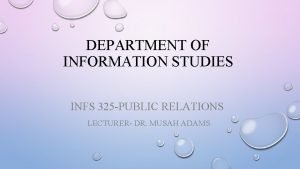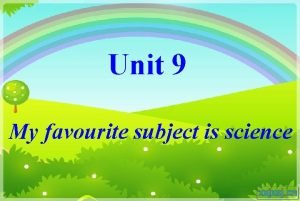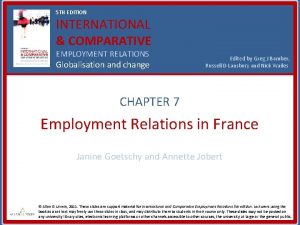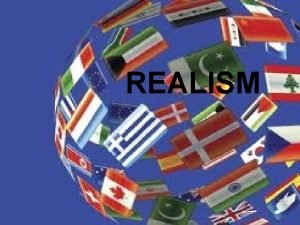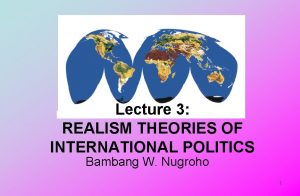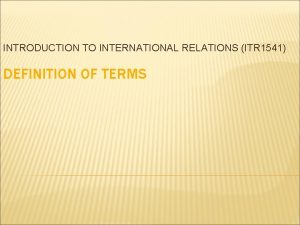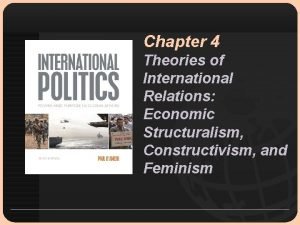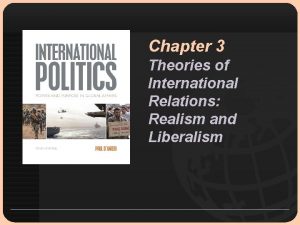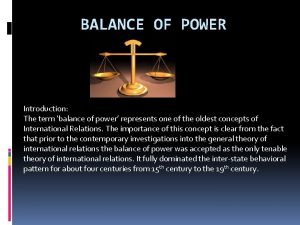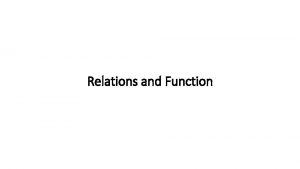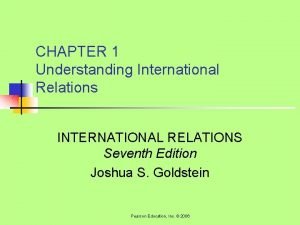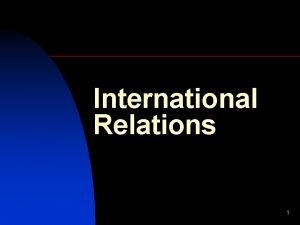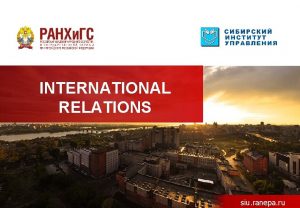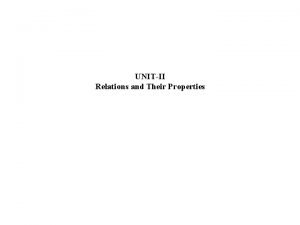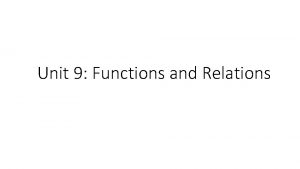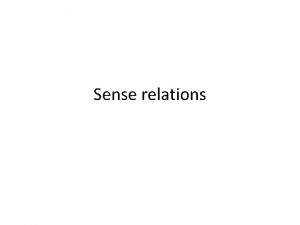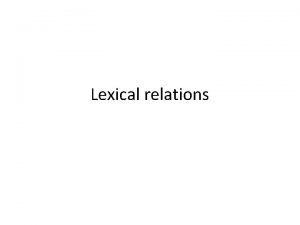Political Science and International Relations Political system of












- Slides: 12

Political Science and International Relations Political system of the state

Aim of lecture • To introduce to main characteristics of the political system • To clarify the status of the armed forces in a democratic state • To summarize the political attitudes towards the main problems of armed forces building

Agenda • • • Democracy Institution of democratic state Political system Civil and military relations in democracy Democracy and Armed forces

Democracy • Democracy is a system of government ensures that (all) citizens can participate in selecting of government • Power belongs to all citizens, and only citizens can therefore decide who, and in what way it is supposed to do • This decision is done through voting of citizens, based on the free and universal right of election • Conflicts in society are resolved through political negotiations and through elected representatives of majority voting • There is a system of independent courts, which guarantees equality before the law for all citizens

Democratical political system • Parliamentary system – The system is based parliament, gaining legitimacy through elections by citizens – Parliament through a vote of confidence transfer the legitimacy to government – The government can not govern without the support of Parliament

Democratical political system • Presidential system – The strong position of the president, who himself has gained legitimacy from the people through direct elections – The President may also be a prime minister and appoint a government – Parliament passes laws and controls the government that it can govern without the support of the majority of parliament, because its legitimacy is based on the position of president

Political parties • All citizens may enter the political competition through elections and seek to share governance • Citizens who want to participate in the power in the state are members of political parties. Political parties are trying to get a share of political power • Parties present their political programs to citizens and seek to get their votes • Successful representatives of parliamentary political parties create parliamentary clubs • Successful parties negotiating together in an effort to form a parliamentary majority that allows them to form a government and to approve laws

Groups of interests, civil society • Interest groups representing the interests of the society and the stay outside of the political competition • Interest groups do not seek to gain power in the election, but try to influence the power in your area of interest • Organized interests are a natural part of a democratic society • Civil society is a network of citizens' groups that organize nonpolitical life in society

Political system of the Czech Republic • Chamber of deputies elected by proportional electoral system gives confidence in the government • Senate Elected by majority electoral system has the function of stabilizer and fuses • President elected directly by people – since 2013 • The government appointed by the president on the basis of voting in Parliament has executive power • Constitutional Court - judges appointed by the president, the guarantor of the Constitution of the Czech Republic • The Constitution defines the functioning of the political system can be changed by vote of a constitutional majority (both Houses of Parliament)

State and Armed Forces • The Armed Forces - the best organized, trained, armed group in the state is primarily determined by the application of stateorganized violence. But it is not only, because it is part of the armed forces and the armed corps, which are in most states also the police and some other components • In a democracy, the military can be treated as a politically neutral tool, that builds a society voluntarily to face any danger. Armed Forces are giving up part of its rights and remedies, which according to theory of the social contract, define that the society has the right to manage and control the armed forces by tools of civil proceedings and democratic control

Civil control of AF Models of civilian control and democratic control of the armed forces applied in democratic states often show relatively large differences. Still, however, there are some general features that are common to all models applicable. These include: – A clear definition of the relationship between the armed forces, the society and its top-level authorities in the legal system of the country – Subordination of the armed forces to the rule of law – Right of society in formulating decisions regarding the armed forces through parliament and president elected by citizens – The primacy of civilian persons in enforcing policy decisions expressed mostly civilian defense minister – Control of the armed forces through the free action of the mass media

Political Science and International Relations Political system of the state
 Employee relations in public relations
Employee relations in public relations Why science is your favourite subject
Why science is your favourite subject Politics and international relations bath
Politics and international relations bath International and comparative employment relations
International and comparative employment relations Realist theory of international relations
Realist theory of international relations Realist theory of international relations
Realist theory of international relations Balance of power in international relations
Balance of power in international relations Examples of international relations
Examples of international relations A level politics comparative theories
A level politics comparative theories Constructivism in ir
Constructivism in ir Constructivism vs structuralism
Constructivism vs structuralism Realist theory of international relations
Realist theory of international relations Balance of power in international relations
Balance of power in international relations
